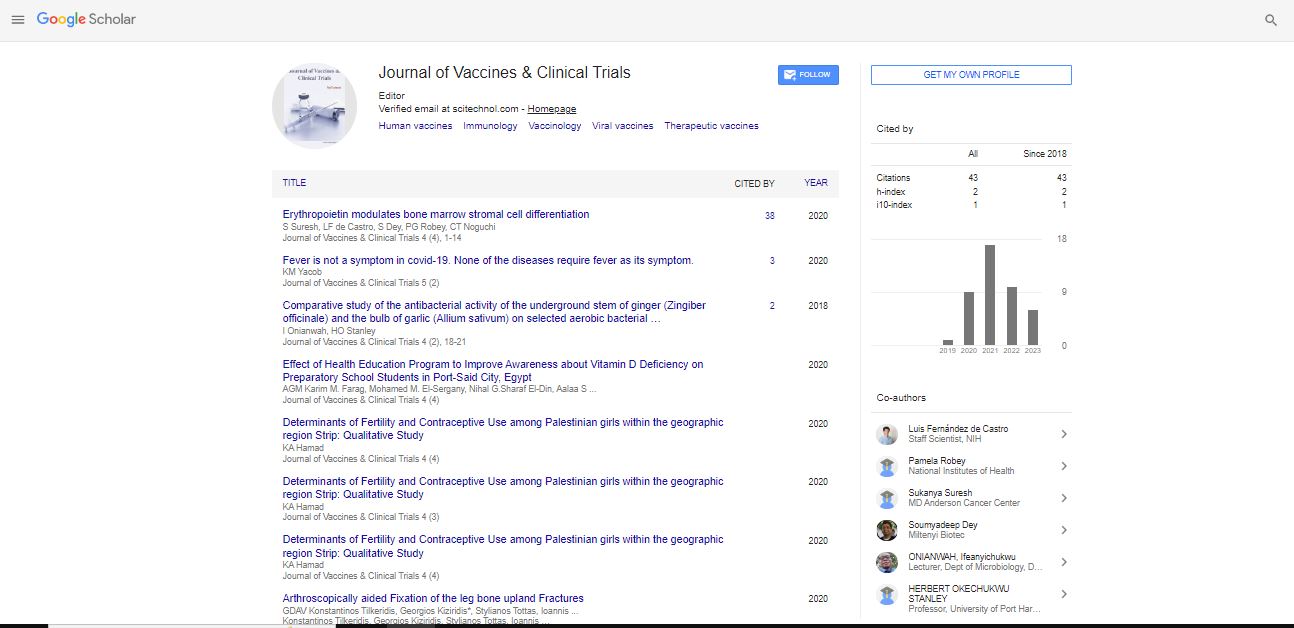Commentary, Jou Of Vac Cli Tr Vol: 7 Issue: 3
Advancements in Vaccinology for Preventing Future Diseases
Sulaiman Tomazic*
1Department of Biochemistry, Abdul Wali Khan University Mardan, Mardan, Khyber Pakhtunkhwa, Pakistan
*Corresponding Author: Sulaiman Tomazic,
Department of Biochemistry, Abdul
Wali Khan University Mardan, Mardan, Khyber Pakhtunkhwa, Pakistan
E-mail: sulaimtomaz@awkum.edu.pk
Received date: 28 August, 2023, Manuscript No. JVCT-23-118126;
Editor assigned date: 31 August, 2023, PreQC No. JVCT-23-118126 (PQ);
Reviewed date: 14 September, 2023, QC No. JVCT-23-118126;
Revised date: 21 September, 2023, Manuscript No. JVCT-23-118126 (R);
Published date: 28 September, 2023, DOI: 10.4172/JVCT.100081
Citation: Tomazic S (2023) Advancements in Vaccinology for Preventing Future Diseases. Jou of Vac Cli Tr 7:3.
Description
The history of vaccines is a story of remarkable accomplishments in public health. Vaccines have saved countless lives, prevented innumerable cases of disease and contributed to the near-eradication of some of the deadliest pathogens in human history. Today, as the world faces new and evolving threats from infectious diseases, the field of vaccinology is advancing rapidly to stay ahead of the curve.
Vaccinology, the science of vaccine development, is grounded in immunology, microbiology and epidemiology. It seeks to rely on the knowledge of the immune system and infectious agents to develop efficient vaccinations. These vaccines stimulate the immune system to produce a protective response, thereby preparing the human body to defend against the pathogen if encountered in the future.
One of the key challenges in vaccinology is staying ahead of emerging pathogens. As new diseases or variants of existing pathogens emerge, vaccinologists must adapt quickly. Recent examples include the development of vaccines for emerging infectious diseases like Coronavirus Disease 2019 (COVID-19). The rapid development of multiple COVID-19 vaccines demonstrated the adaptability of vaccinology and its potential to address emerging threats.
Advancements in molecular biology and genomics have revolutionized vaccinology. By sequencing the genomes of pathogens, scientists can identify specific proteins or genetic markers that can be targeted by vaccines. This precision allows for the development of highly effective vaccines with reduced side effects.
Vaccinologists are exploring various vaccine platforms, which are versatile approaches to vaccine development. These platforms can be quickly adapted to target different pathogens. For example, messenger RNA (mRNA) vaccine platforms, as seen in the COVID-19 vaccines, can be readily modified to address different infectious agents. This adaptability enables vaccinologists to respond rapidly to emerging threats.
The field of synthetic biology is making its mark on vaccinology. Scientists are designing vaccines at the molecular level, using genetic engineering to produce synthetic antigens that trigger an immune response. This approach offers precision and predictability, potentially leading to more effective vaccines against a wide range of infectious diseases.
In the era of personalized medicine, vaccinology is exploring individualized vaccine approaches. Personalized vaccines take into account a person's unique genetic makeup and immune response to produce vaccines that is highly effective for that individual. This approach could maximize protection while minimizing side effects.
Safety is paramount in vaccine development. Vaccinologists work diligently to ensure the safety of vaccines, conducting extensive analysis and clinical trials to evaluate potential side effects and adverse reactions. Vaccine safety systems are continually improved to detect and investigate any potential adverse events.
The field of vaccinology is moving toward more precise immunization strategies. This includes customizing vaccinations to specific populations or age groups, considering individual variations in immune responses. For example, older adults may require different formulations or schedules to ensure vaccine efficacy.
Vaccinologists and analysts worldwide collaborate and share data and findings. This collaboration is particularly important during global health crises, such as the COVID-19 pandemic, where information exchange and collective efforts have accelerated vaccine development and deployment.
While striving for vaccine efficacy is essential, ensuring equitable access to vaccines is equally important. Advancements in vaccinology must be accompanied by efforts to address vaccine distribution disparities and provide vaccines to underserved communities around the world.
Vaccinology faces not only scientific challenges but also social and behavioral ones. Vaccine hesitancy and misinformation can hinder efforts to prevent diseases. Vaccinologists and public health experts must work together to address these issues and communicate the safety and efficacy of vaccines effectively.
Herd immunity, achieved through vaccination, is a primary goal of vaccinology. It occurs when a sufficient percentage of the population becomes immune, reducing the spread of disease and protecting those who cannot be vaccinated. Vaccinologists play a pivotal role in planning and coordinating vaccination strategies to reach herd immunity thresholds for different diseases.
Vaccinology is where scientific innovation meets public health. It is the bridge that transforms laboratory analysis into real-world protection. The field's growth and adaptation are essential for safeguarding global health and mitigating the impact of future disease outbreaks.
 Spanish
Spanish  Chinese
Chinese  Russian
Russian  German
German  French
French  Japanese
Japanese  Portuguese
Portuguese  Hindi
Hindi 